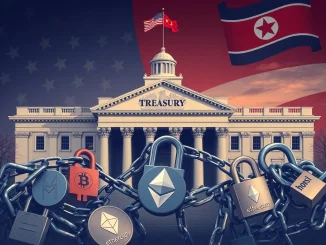
Are you keeping up with the latest moves against illicit activity in the crypto space? The U.S. government is taking a significant step, proposing to cut off the Telegram-based illegal marketplace known as Huione from the U.S. financial system. This action, led by the U.S. Treasury’s Financial Crimes Enforcement Network (FinCEN), highlights ongoing efforts to combat the use of digital assets for criminal purposes.
Why is FinCEN Targeting Huione?
The U.S. government, through FinCEN, has officially designated Huione as a primary money laundering concern. This isn’t a minor wrist-slap; it’s a proposal to sever its access to the vast U.S. financial network. Think of it as a major blockade intended to disrupt the flow of illicit funds.
The core reason for this action is clear: Huione is identified as a significant hub for cryptocurrency money laundering. It provides services that help criminals clean their ill-gotten digital gains, making it a direct threat to financial integrity.
Who is Huione Assisting?
One of the most concerning aspects highlighted by FinCEN is Huione‘s support for malicious actors, including notorious North Korean hackers and other organized criminal groups. These are the entities behind large-scale cyberattacks, ransomware schemes, and various forms of digital theft. By providing laundering services, Huione effectively enables these groups to profit from their crimes and continue their operations.
The platform is described as a Chinese-language Telegram marketplace operating out of Cambodia. This geographic and linguistic profile suggests a specific target audience and operational base for its illicit activities.
The Dark Side: Cryptocurrency Money Laundering Tactics Exposed
FinCEN specifically called out Huione for its role in laundering proceeds from particularly nasty scams. This includes funds derived from ‘pig slaughtering’ scams (where victims are groomed over time before being convinced to invest in fake opportunities) and romance scams (where criminals fake romantic intentions to defraud victims).
The fact that a Telegram marketplace like Huione facilitates the cleaning of funds from such emotionally and financially devastating crimes underscores the severity of its operations. It’s not just about moving money; it’s about enabling the exploitation of vulnerable individuals.
Interestingly, Huione recently launched its own stablecoin, USDH. While the FinCEN report doesn’t explicitly detail USDH’s role in the laundering process, the launch of a platform-specific stablecoin could potentially be used to further obfuscate transaction origins and facilitate the movement of funds within or through the Telegram marketplace ecosystem, adding another layer to the cryptocurrency money laundering methods employed.
What Does Cutting US Ties Mean?
The proposed action by FinCEN to cut Huione off from the U.S. financial system is a powerful move. It means U.S. financial institutions would be prohibited from engaging in transactions involving Huione. This makes it significantly harder for the platform, and the criminals using it (including North Korean hackers), to move money into or out of the traditional financial system using U.S. dollar rails or U.S.-based services.
While Huione operates internationally and primarily uses crypto, limiting access to the world’s largest financial system is a substantial blow to its ability to operate globally and interact with broader financial markets.
Conclusion: A Clear Message from FinCEN
The action against Huione sends a strong message: the U.S. government is actively monitoring and pursuing entities that facilitate cryptocurrency money laundering and support malicious actors like North Korean hackers. By targeting a specific Telegram marketplace and proposing to cut its access to the U.S. financial system, FinCEN demonstrates its commitment to disrupting the financial infrastructure of cybercrime. This development is a critical reminder for everyone in the crypto space about the ongoing fight against illicit finance and the importance of regulatory compliance.



